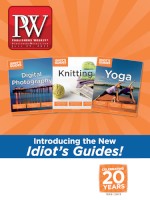Closing in on three decades as an author writing nonfiction books for, from, and about the boomer generation, I thought my career was over. I’d recently produced what assuredly was the best of my 20-plus nonfiction books, a memoir of the tumultuous year I’d spent transiting into the wild space beyond midlife. After repeated rejections, my longtime agent and friend gave me the sad news. “Everybody’s saying the same thing. Boomers aren’t buying nonfiction books about aging unless you’re a celebrity and/or have some great anti-aging diet, financial, reinvention, fashion, or health advice. Otherwise, nobody cares.”
Happily, she was wrong. Fierce with Age: Chasing God and Squirrels in Brooklyn was recently published by Turner Publishing. Of course I’m thrilled. But I’m still pondering why it is that with the superior numbers in our demographic (77.5 million in the U.S. alone are 49–67) and the impressive number of books we purchase, we haven’t at least rivaled, let alone surpassed, books about earlier life stages, such as parenting young children, and books about life balance as the juiciest apple in the industry’s eye.
It’s not that boomers aren’t writing great nonfiction books or that the marketplace isn’t ripe. In fact, I chaired the marketing to boomer panel at BookExpo America two years running, and coauthored both the first and most recent books on marketing to boomer women. But my calculations failed to take what turns out to be the most important factor into account: ageism.
Quietly, many of the boomer-aged nonfiction authors I know complain about the age of most editors, realizing that the first reader on most of our books will be our own daughters’ ages or younger. These gatekeepers naturally respond to the sex appeal of coming-of-age stories, but are rarely in a sufficiently advanced life stage to recognize the potency of coming-into-age—including struggling to embrace the shadow as well as the light sides of transitioning beyond midlife.
When they do publish a book in the category, they gravitate to titles like Younger Next Year, 10 Years Younger, and of course The Life Plan: How Any Man Can Achieve Lasting Health, Great Sex, and a Stronger, Leaner Body. These and most of the other nonfiction books on the “aging” bestseller list aren’t, in reality, books about aging. These are, more to the point, books against aging.
Ageism is not only reflected in the books that get published (or that don’t), but in the industry itself. There’s no better way to tell this story than to share what has become of all the agents, editors, and publicists with whom I broke bread over the past 25 years. Readers of Fierce with Age will get the whole, unvarnished story as I seek to reconnect with old publishing industry friends during the course of the year I spent recently in New York, only to discover that so many had been downsized, retired, or reinvented one way or another out of their careers. But here’s one archetypal story among many. It was one of my old editors, Shelly, who told me about wandering the endless aisles of BEA looking for a familiar face. She’d been hoping to sell her wares as a freelance editor, but all she got was aching arches and a burning question: “Am I really the last of my generation of book people still standing?”
There is a bright side to the fact that so many of us—authors and publishing executives alike—have been marginalized, and that is: we have more time to read. There’s now a Boomer Lit affinity group on Goodreads, and it is boomer women over 50 who are the sweetest spot for most e-book devices. Plus, unlike younger cohorts, boomers still buy print.
But wait. Once again, it is precisely because I have been a cheerleader for so long, stating only what I thought was the obvious—that boomers are important to publishing—that I can only stand back in equal parts gratitude and awe that someone—Turner Publishing—actually agreed.
So here’s to Turner, to Boomer Lit—and to the arrival of that breakthrough book that will punch a big enough hole in the stereotypes of aging to let the best of the rest through. The market’s there. We’re ready. There’s lots of money to be made. Now go buy one of our books.



 Volume 260
Issue 30
07/29/2013
Volume 260
Issue 30
07/29/2013





